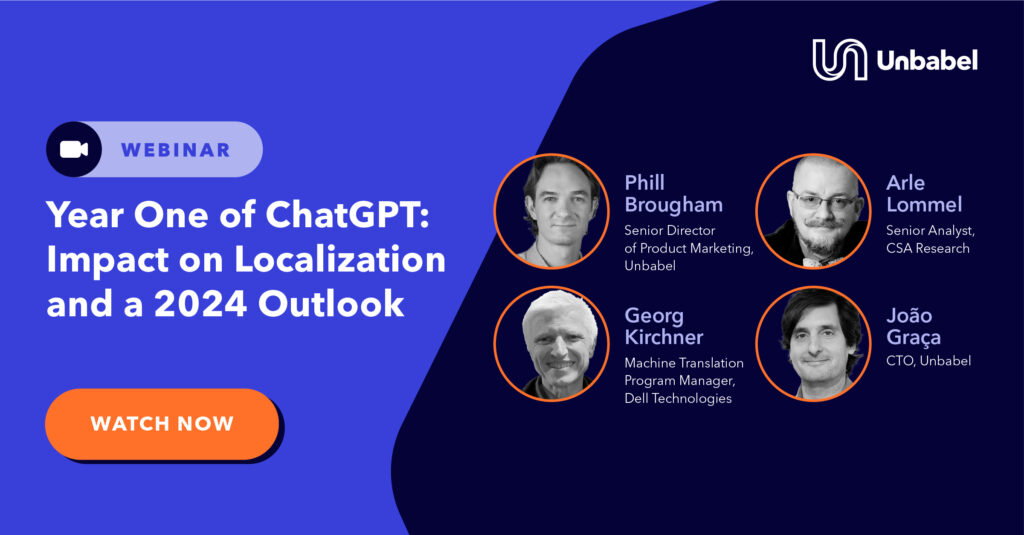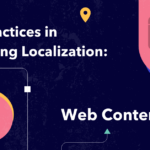The story of Generative AI and Large Language Models (LLMs), best represented by ChatGPT, have taken center stage in the world of translation and localization. One year on since the technology’s debut, how have businesses and localization teams had to adapt? What does success with AI look like today, and what does 2024 have in store for the technology?
Recently, we spoke to a panel of experts including Phill Brougham, Senior Director of Product Marketing at Unbabel, João Graça, Chief Technology Officer at Unbabel, Arle Lommel, Senior Analyst at CSA Research and Georg Kirchner, Globalization Technology Manager at Dell where we review the impact of ChatGPT and share an outlook into the coming year.
During the webinar, we explored how ChatGPT has changed the way organizations work, how to set expectations internally, the common pitfalls of using AI in translation and localization, and more.
Let’s dive in.
Looking Back at Year One of GPT
After a year since its debut, there’s no denying ChatGPT has been revolutionary and has led to a whole wave of innovations. While businesses experienced this shift in different ways, the impacts were clear. So how did our experts see this shift personally?
“Dell Technologies is very excited about the opportunities that this next wave of AI adoption brings for us,” Georg shared. “The company has appointed a chief AI officer and introduced an AI review board that is coordinating activities throughout the enterprise. And for me, at a personal level, I have to say that, ChatGPT has really opened doors to new skills that I really didn’t expect at this point.”
And while AI has largely been positive, it’s important to have a healthy level of skepticism Georg shares. “There’s so much hype involved as well, so you have to be a little bit jaded to just filter out the noise and then stay focused on your work.”
What does this mean for the industry as a whole though?
“We’re entering what we’re now calling the post-localization era,” shares Arle. “When everything’s gonna be machine and human, and increasingly the boundaries between services are going to blur. So at least from our perspective, it’s clear that generative AI is having a substantial impact on the language services sector and on the companies that are buying it.”
Diving into the technological aspect of it, “LLMs aren’t that new and it’s rather the interface and ChatGPT experience, as well as the advancement of generative AI, and ChatGPT are not state of the art,” João goes on to share. But quality can remain a concern.
“How do I know if I have quality?” João continues. “And so you see more companies talking about quality estimation that we’ve been using for years and trying to assess the quality of a translation because they removed the human from the loop.”
Best Practices for ChatGPT, Generative AI, LLMs Today
While AI can be highly beneficial, it can also have pitfalls and hiccups businesses must avoid. How can companies adopt AI and experience these benefits while avoiding risks at the same time?
“Regarding ChatGPT or any other translation system: what is important to use this technology intelligently is having the ability to evaluate the quality of translations, while also mapping these to expectations (or what you paid for), and reporting on performance,” says João. “Another thing to be aware of is the level of security of ChatGPT, and consider that data flows may pose a risk. As soon as content is entered into ChatGPT, data is transmitted and stored to an external server, making it impossible for the company to retrieve it.”
The bottom line is AI cannot do it all alone and translation is not a one-step process.
“It’s important not to think of translation as one step,” João continues. “It’s better to think about it more like localization, which is many steps – and you need an AI partner that is going to translate terms consistently, entities, transliterate, perform machine translation of course, measure quality and of course assist humans in spotting critical errors.”
Looking Ahead
AI is empowering companies and individuals to generate more content and subsequently translate that content simpler than ever and we are only one year into the era of GPT. So, what’s next?
“I think this quality estimation is gonna be key, and we’re starting to see it really improving,” Arle says. “I don’t think it’s quite there yet for everybody to adopt, but when it is, that’s gonna revolutionize the work of individual linguists, because then you can have the machine start serving them what they need to see and not serving up.”
And the improvements will only continue, João shares.
“I think we’ll see a lot of improvements on the underlying large language models,” João says. “I think we’ll see smaller models with the same accuracy, which is important because these things are very expensive to end production, and they present a lot of problems when you try to run them at scale. I think we’ll see improving work on the LLM, and I am also very excited to see the plug-ins and what they can do.”
Interested in learning more about where GPT has been and where it’s going? Watch the full webinar here.












